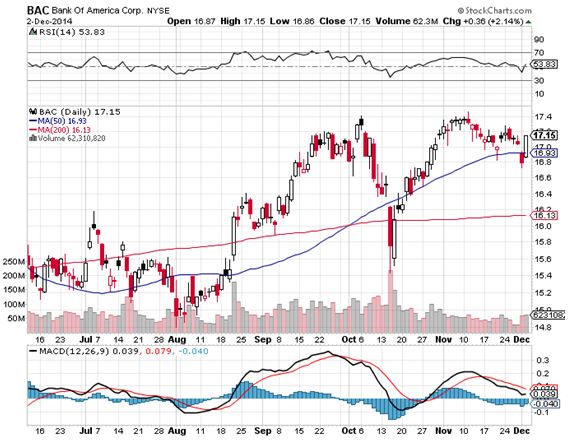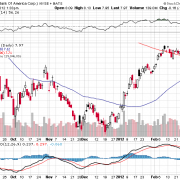A Special Note on Exercised Bank of America Options
This morning, Bank of America paid out a five cent quarterly dividend, which works out to an annualized yield of 1.18% and the shares will open this morning trading ex.
For those of you who have wisely followed my Trade Alert to buy the Bank of America (BAC) December, 2014 $15-$16 vertical bull call spread, good for you. As of last night, you were showing a profit of 0.88% on the position.
However, there is a chance that the short side of the trade, the December, 2014 $16 calls were exercised against you before the opening this morning. If that is the case, you would have been informed by your broker by email and immediate action is required on your part to avoid unnecessary risk.
The options traded on US exchanges and referred to in my Trade Alerts are American style, meaning that they can be exercised at any time by the owner. This is in contrast to European style options, which can only be exercised on the expiration day.
The vertical option spreads that I have been recommending for the past year are composed of a deep in-the-money long strike price plus a short portion at a nearer money strike price.
When stocks have high dividends, there is a chance that the near money option you are short, the December, 2014 $16 calls, gets exercised against you by the owner.
This requires you to deliver the stock equivalent of the option you are short, plus any quarterly dividends that are due. Don?t worry, because your long position perfectly hedges you against any principal risk in this situation.
However, you will be liable for the five-cent dividend, which works out to $5 for every call option you are short. If you executed the full 110 contracts recommended in my Trade Alert that works out to $550 (100 shares per option X $.05 dividend X 110 contracts).
You then need to email or call your broker back immediately informing him that you want to exercise your remaining long option position to meet your assigned short position.
This should completely close out your position and leave you with about half your remaining profit. This is not an automatic process and requires action on your part!
It also means that you get your margin back, plus your profit, the next day, and don?t have to run the position another two weeks into expiration. That means you are free to use the money to put on new trades.
Assignments are made on a random basis by an exchange computer, and can happen any day. You may get exercised, or you may not. Exercise means the owner of the option that you are short completely loses the entire premium on his call.
Dividends have to be pretty high to make such a move economic, usually at least over 3% on an annual rate. But these days, markets are so efficient that traders, or their machines, will exercise options for a single penny profit.
In fact, there are now some dedicated hedge funds and independent individual options traders that specialize in buying up calls the day before and ex dividend day to capture a tiny 29 basis point gross overnight profit. That is before execution expenses.
It hardly seems worth it to me, but I guess what they lack in size, they make up in volume. Hey, you do what you can do to earn a living.
Surprise assignments create a risk for option spread owners in a couple of ways. If you don?t check your email every day, you might not be aware that you have been assigned.
Alternatively, such emails sometimes get lost, or hung up in local servers or spam filters, which occasionally happens to readers of my own letter.
Then, you are left with the long side deep out-of-the-money call without on offsetting short position. You are now unhedged. This means you will have a substantially higher margin requirement, and is the equivalent of going outright long the stock in large size.
Suddenly, you are playing a totally different game, and not one I recommended. If the stock rises, then you could be in for a windfall profit. But if it falls, you could take a big hit. Guess which way the stock usually goes.
Better to completely avoid this situation at all cost and not take the chance. You are probably not set up to do this type of trading.
If you don?t have the cash in your account to cover this, you could get a margin call. If you ignore this call as well, your broker will close out your position at market without your permission.
It could produce some disconcerting communications from your broker. They generally hate issuing margin calls, and could well close your account if it is too small to bother with, as they create regulatory issues.
In order to get belt and braces coverage on this issue, it is best to call your broker and find out exactly what are their assignment policies and procedures. Believe it or not, some are still in the Stone Age, and have yet to automate the assignment process or give notice by email.
An ounce of prevention could be worth a pound of cure here. You can?t believe how irresponsible some of these people can be. The phone calls are free.
Consider all this a cost of doing business, or a frictional execution cost. In-the-money options are still a great strategy. But you should be aware of all the ins and outs to get the most benefit.
Good Luck and Good Trading
John Thomas





